Air conditioners without an external unit
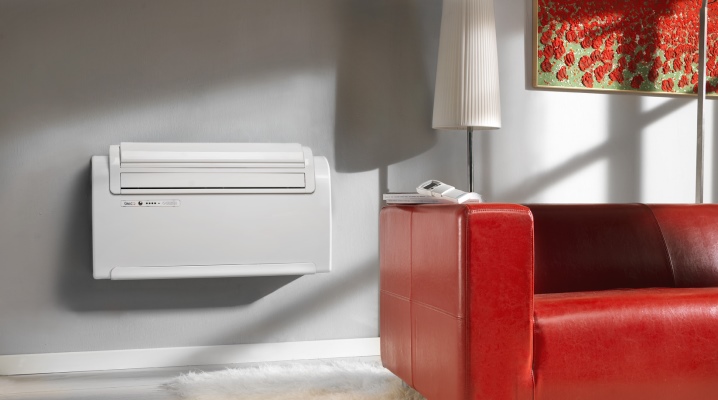
The daily emissions of large amounts of toxic substances into the atmosphere by large industrial enterprises, as well as the constant increase in the number of cars that contribute to environmental pollution, have a negative impact on the climatic indicators of the entire planet. Over the past decades, scientists have recorded the annual increase in the Earth's temperature.
This factor is especially felt by residents of large cities, in which most of the territory is covered with concrete, and green areas occupy an insignificant area.
It is almost impossible to live comfortably in stuffy megacities without air conditioning. Given the ever-growing demand for these devices, manufacturers are constantly working to improve new devices.
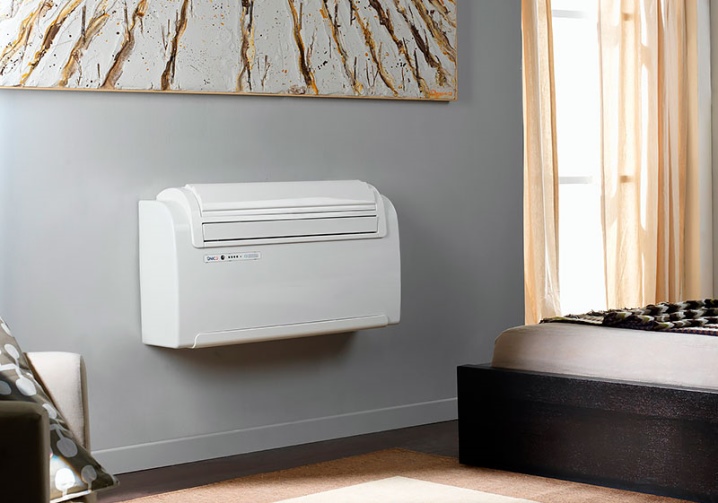
Description
An air conditioner without an external unit is a new generation air conditioner. Due to the frequent impossibility of installing a classic column air conditioner without air extraction, manufacturers have developed an improved model of a split system without an outdoor unit.
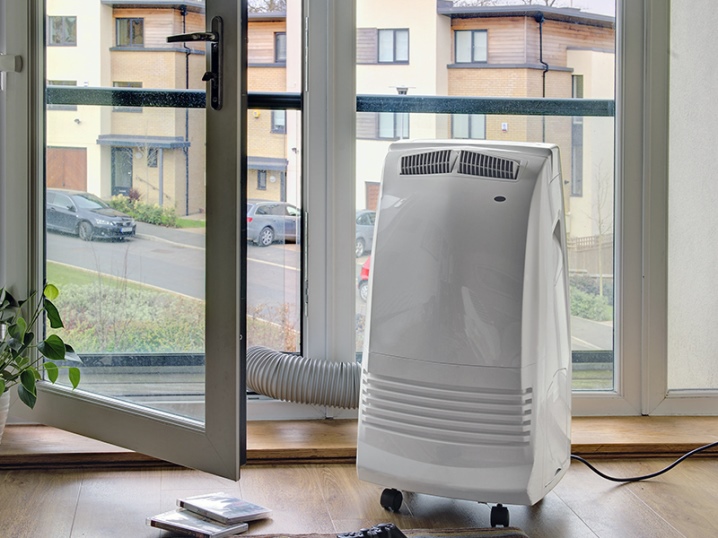
Reasons for abandoning standard climatic technology:
- the presence of the historical value of the building;
- insufficient length of the freon line;
- the presence of a rented or office space;
- dilapidated building facade.
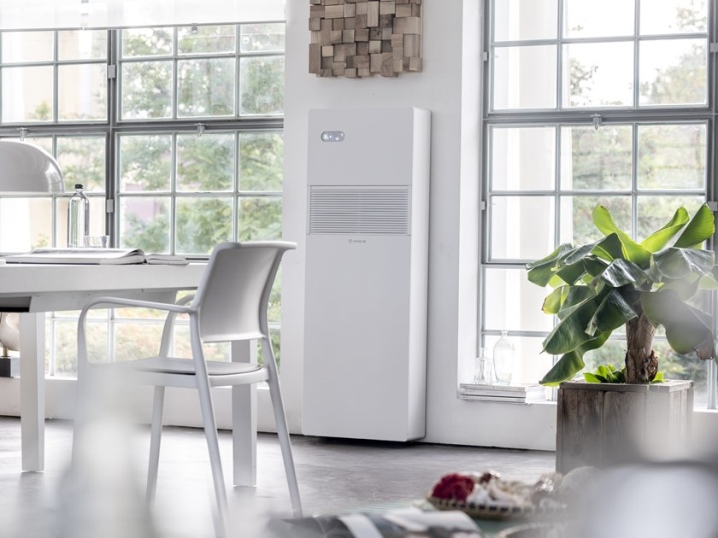
Functional features of the device:
- temperature control;
- regulation of the power of air flows;
- switching of operating modes;
- adjustment of the direction of air masses.
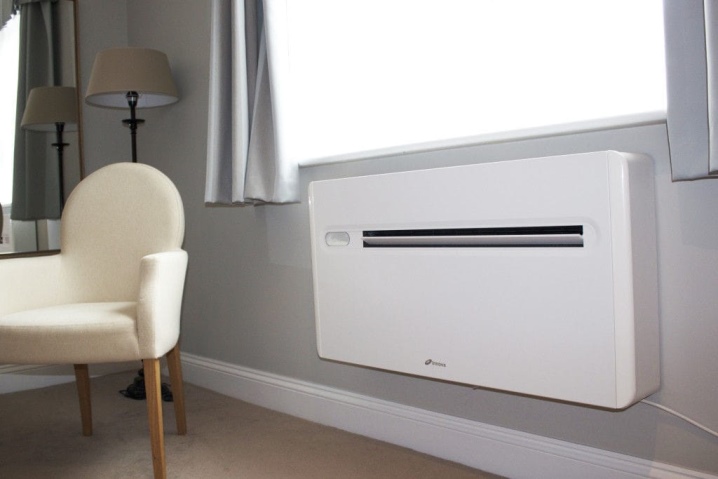
Wall-mounted monoblocks have a large number of features similar to classic split systems and consist of the following elements:
- capacitor;
- refrigerant evaporator;
- ventilation system;
- compressor;
- filtration system;
- drainage system;
- automatic control system.
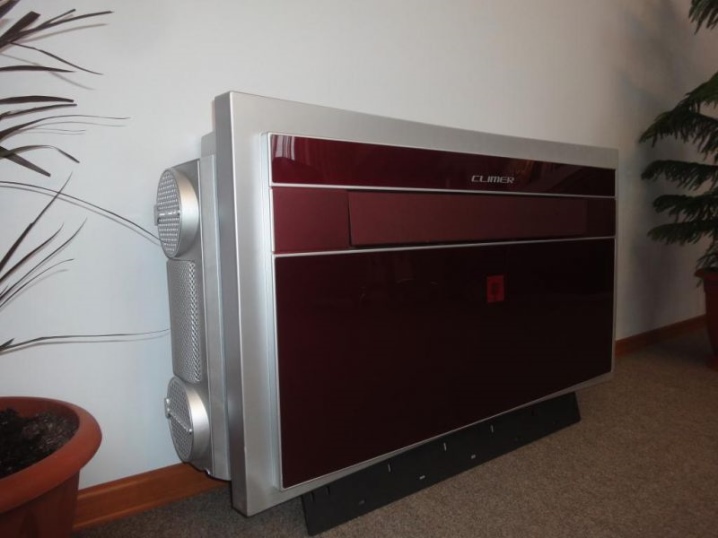
Particular attention should be paid to the autonomous control system, which makes it possible to regulate the power of the device. This manipulation can be carried out both with the help of the remote control and directly through the buttons on the case.
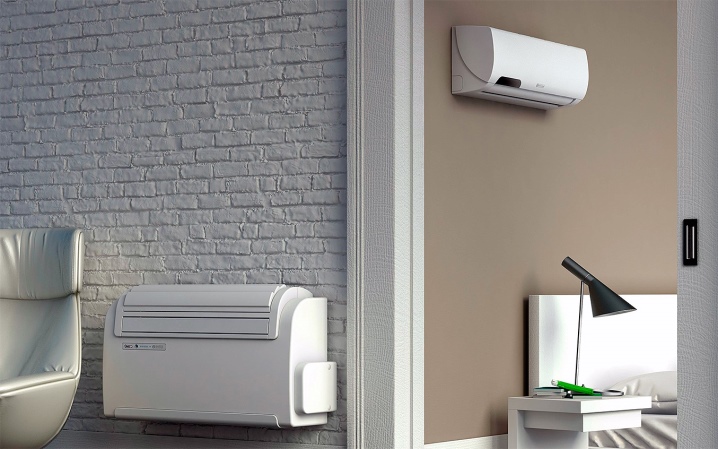
Like any air conditioning system, these room devices have both positive and negative sides.
Advantages:
- no need to install an outdoor unit;
- the possibility of using the air conditioner in rooms of architectural and historical value;
- ease of installation;
- environmental Safety;
- high level of duct air exchange efficiency;
- the absence of bulky and unaesthetic structures on the facade;
- the ability to install after repair work;
- no need to obtain special permits;
- the presence of automation, which simplifies the control of the drainage system;
- the ability to connect to the heating system;
- improvement of the indoor climate due to street air masses;
- the maximum level of purification of the incoming air;
- the presence of a heat recuperator;
- lack of a drainage system.
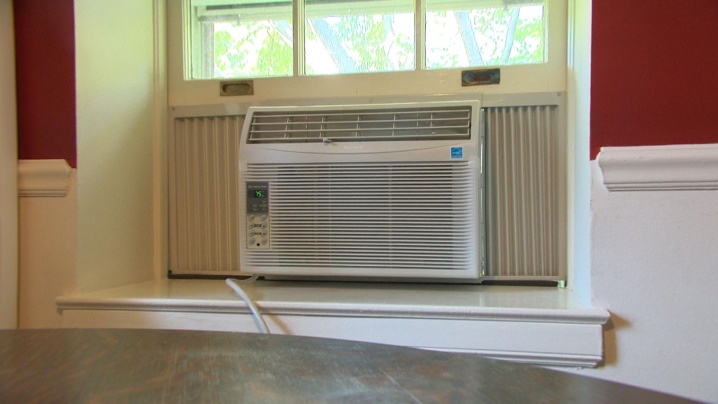
Disadvantages:
- high price range;
- low power level;
- cooling of a small area;
- high noise fluctuations;
- low heating level in winter;
- the need to drill special channels for ventilation lines;
- increased dryness of the air;
- possibility of mounting only on an external wall.
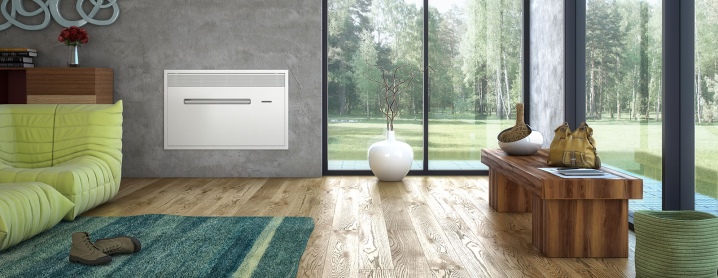
Views
On the shelves of specialized stores, you can see a wide range of air conditioners without an external unit. Experts distinguish the following types of these devices.
- Wall mounted - a suspension device that simultaneously combines an evaporator and an air conditioner in one housing. Feature - the absence of a freon line.

- Floor standing - unpopular devices that require communication exits to the window opening, which is a non-functional feature.

- Window - models used in industrial premises. Advantages - the location of most of the structure outside the window.
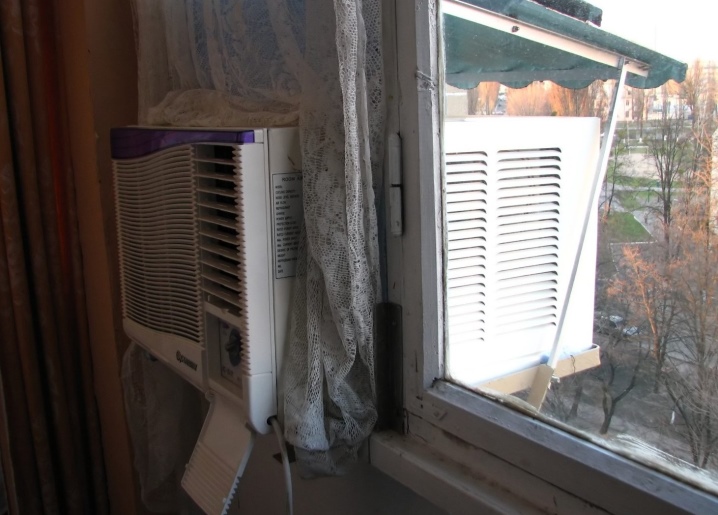
- Mobile - mobile devices, which can be changed location. Disadvantages - large size and weight, high level of noise frequencies, mandatory presence of a ventilation duct or window.
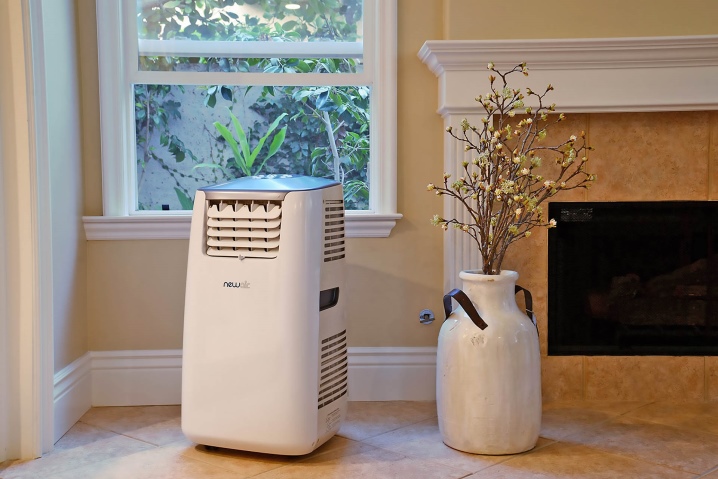
Principle of operation
The principle of operation of the air conditioning system without an external outdoor unit is similar to the operation of traditional climatic equipment for the home, but it still has a number of features. The scheme of operation of the device consists in cooling the air in the condenser and taking heat from the environment by the evaporator., and the operation of the ventilation system contributes to the release of air masses outside through special adjustable louvers.
A distinctive feature is the presence of two ventilation outlets, which are located inside the outer wall.
The first channel promotes the flow of air into the device, and the second line is designed to discharge the warm exhaust air into the environment.
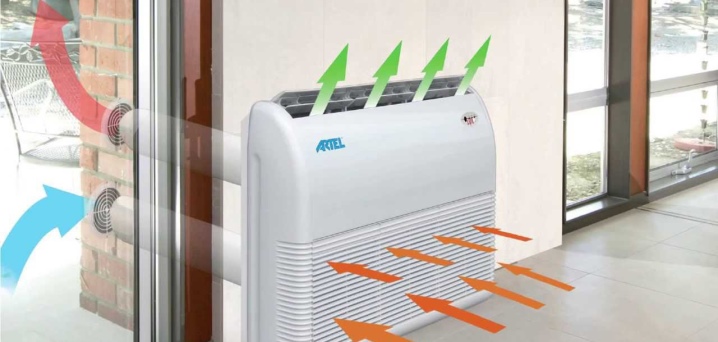
Experts recommend paying attention to the work of more advanced air conditioning models, in which specialists have connected the supply and exhaust system with energy-saving recuperators. This design makes it possible to cool and heat the air in the room with the minimum amount of energy. The peculiarity of the device is the heating of the room with the help of waste warm air, which enters the incoming air flow.
The disadvantage is the high price range.
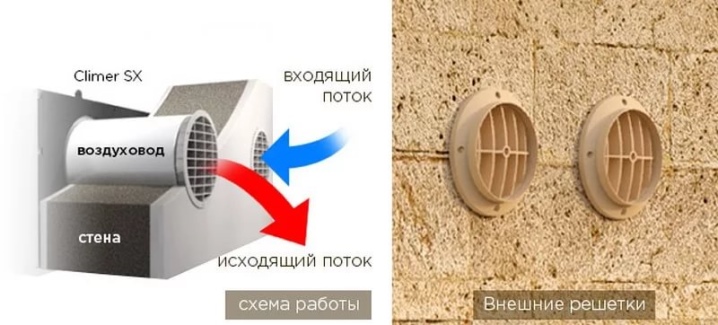
Like all technical devices, an air conditioner without an outdoor unit requires periodic maintenance, which consists of the following activities:
- cleaning the filter from impurities by flushing the system followed by drying it;
- cleaning the drainage system from the accumulated condensate.
In the absence of experience in servicing these devices, it is better to entrust these activities to specialists and employees of service centers, who will not only clean all the elements of the device, but also make a complete revision of the device.
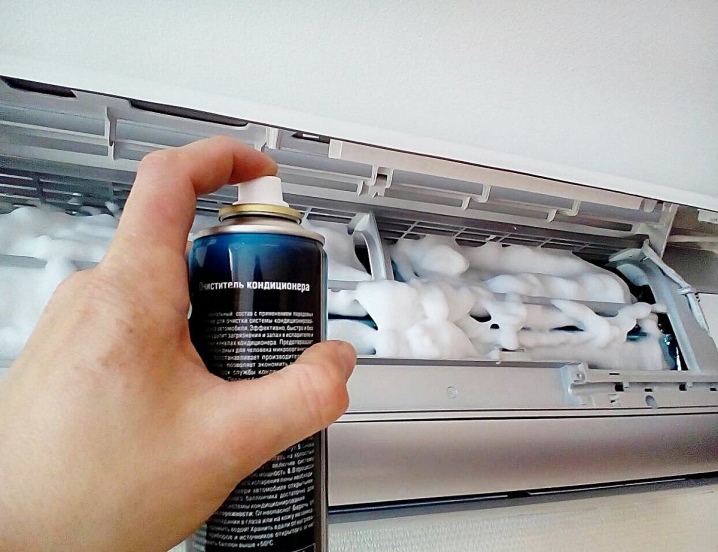
Installation methods
Despite the external simplicity of the device of the new generation internal split-system, it is better to entrust its installation to specialists.
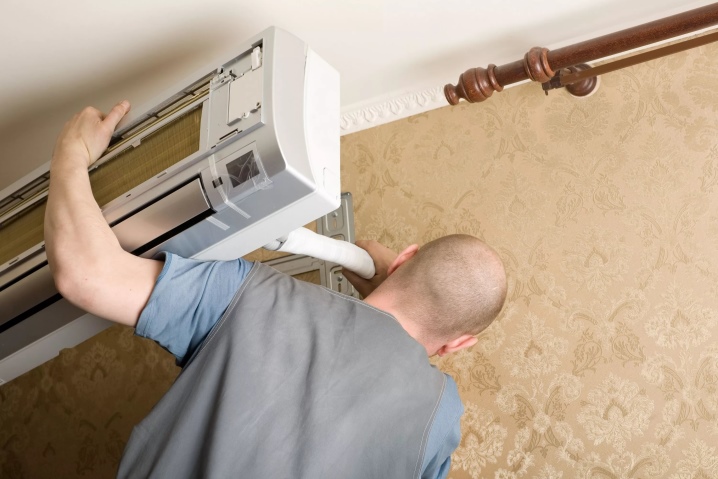
Regardless of the type of device, the installation method always remains the same and consists of the following steps:
- choosing a place on the outer wall of the room;
- marking the required number of holes for installing fasteners;
- determination of the location of the holes for the ventilation ducts;
- drilling channels for air circulation;
- creating holes for the drainage pipe;
- installation of all provided communications;
- mounting the monoblock on the wall.
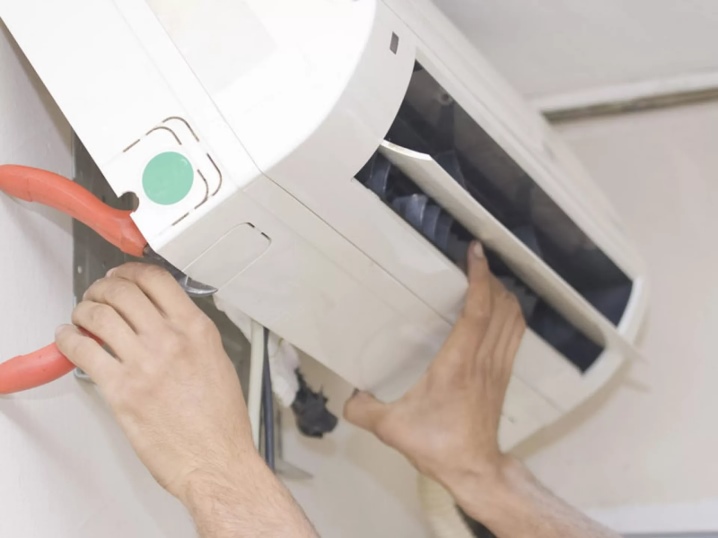
When installing the system yourself, experts recommend paying attention to the fact that the installation of the air conditioner is possible only on the outer walls of the apartment.
All other surfaces are not suitable for this type of work. The place for placing the indoor device depends on the individual wishes of the owner of the apartment, as well as on the general stylistic direction of the room.
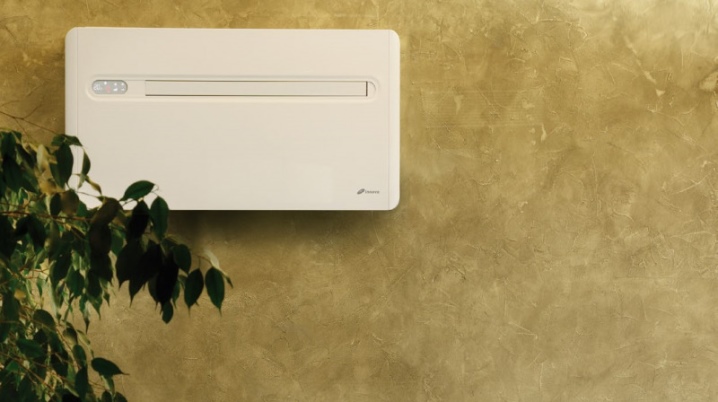
Selection rules
In order to get the most out of the purchased appliance, it must be chosen correctly.
The main parameter when buying an air conditioner is to determine the area of the room where it will work.
This value must fully comply with the parameters specified in the technical instructions.

An important indicator is its functional equipment. Each customer must determine for himself the functions that will be used. With a limited budget, consultants do not recommend overpaying for unnecessary parameters and purchasing multifunctional models.
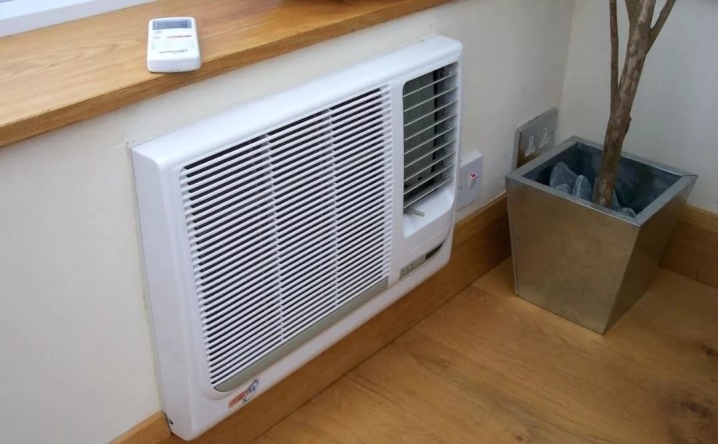
For buyers who plan to heat the premises using monoblocks, experts recommend taking into account the fact that these devices can be used for heating only if the ambient temperature is not lower than - 15 degrees. But even using the device within the established framework, it will not be able to heat the room with high quality, and the blown out air will not be hot.
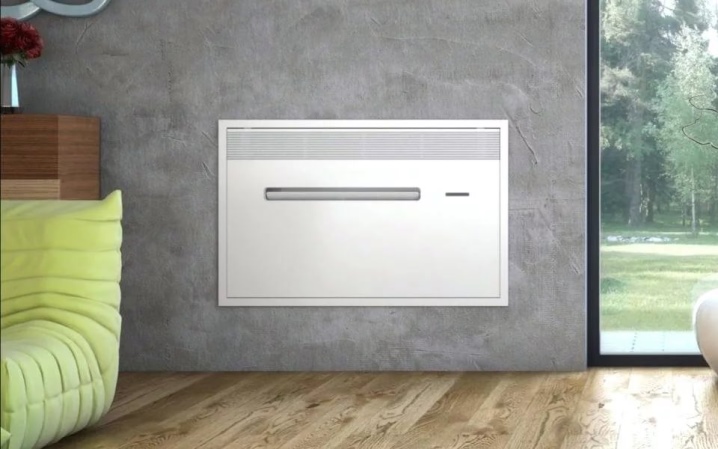
Buyers with a larger budget are advised to pay attention to a unique development - a wall-mounted air conditioner without an external unit with supply and exhaust ventilation and a heating function from a water heating system.
The multifunctionality of the device makes it possible to refer it to a full-fledged climate center, which has the following functions:
- heating or cooling of air streams;
- emission of polluted air into the street;
- air cooling using the inverter method;
- heating air masses using the coolant of the water heating system.

Before making the final decision on the purchase of this unit, it is necessary to understand that it is capable of serving only the room in which it is located. He cannot improve the climate of other rooms.
In order for the human body to fully rest and work, it needs to be in comfortable climatic conditions. In winter, the centralized heating system helps to create coziness, but in the summer, the room in which people are located must be equipped with an air conditioning system.
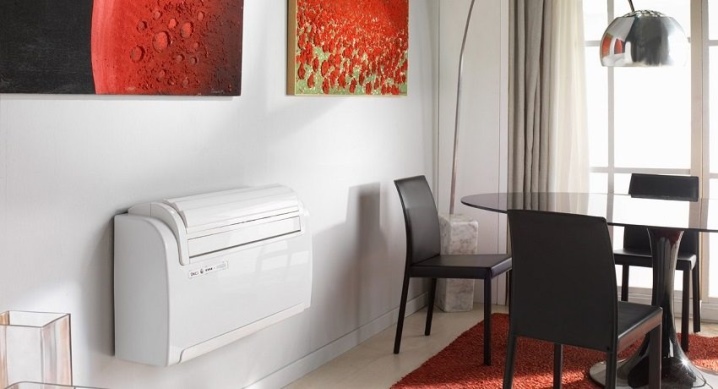
Modern manufacturers have taken care of producing a wide range of devices that differ in power, price range and functions. A novelty in this industry are air conditioners without an outdoor unit, which have a number of indisputable advantages and are in demand among customers.
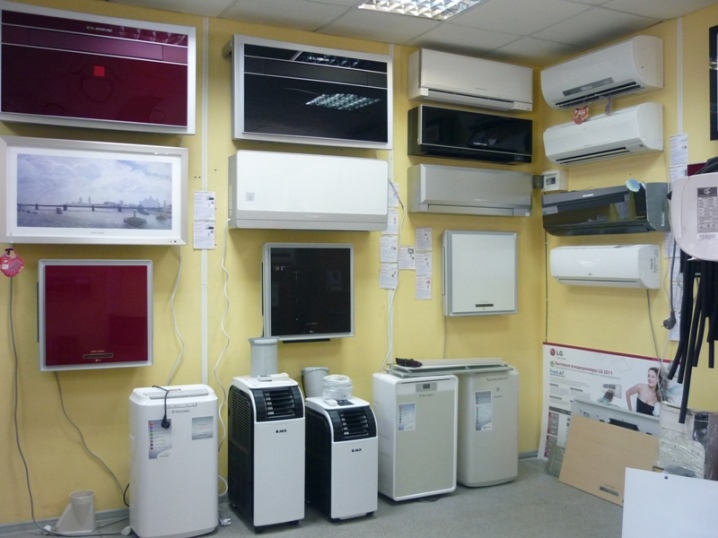
In the next video you can watch the installation of the air conditioner without the Climer SX 25 outdoor unit.













The comment was sent successfully.